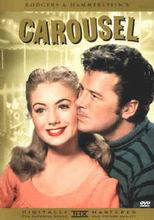Rodgers and hammerstein’s carousel
Director Henry King brought the Richard Rodgers-Oscar Hammerstein II musical “Carousel” to the screen with all of its heartbreak and whimsy, and using a combination of fanciful studio sets and location shots, managed to create a musical that is pure fantasy but has an edge of reality to it. Reuniting “Oklahoma” stars Shirley Jones and Gordon MacRae (subbing for Frank Sinatra, who objected to filming two versions of the film: one in Cinemascope, the other in full frame), “Carousel” is a joyous celebration of song and hope. Set in a small fishing village in Maine, “Carousel” stars MacRae as Billy Bigelow, a womanizing carny barker who sets his sights on young Julie (Shirley Jones).
For Julie, it’s love at first site, and before long, she’s Mrs. Billy Bigelow. It doesn’t take much longer before Julie is with child, and desperate for money, Billy agrees to join a shady friend in a robbery. The robbery goes south, and Billy is fatally stabbed in the process. His death doesn’t come as much of a surprise, because as “Carousel” begins, Billy is in heaven, quietly polishing stars when he’s advised that his family needs his help back on Earth. Billy tells the story of his life in order to receive a one-day pass back to Earth so he can help his young daughter Louise cope with her tough life.
MacRae and Jones are sensational together, even though you get the feeling MacRae is trying to capture the flavor of Sinatra in his performance. I thoroughly admire Jones, who also starred in another of my favorite musicals (“The Music Man”). She’s one Partridge who’ll always have a soft place in my nest. I liked the film version because King deftly mixed obvious indoor sets with outdoor locations, and even though the contrast is jarring, it creates a visual connection that totally works for the film. It’s what I like to call real movie magic, and its use here casts a spell over the viewer that is intoxicating.

COMPLETE CHECK-UP
VISION: Good
Okay, here’s the deal. Up until Chapter 13, the 2.55:1 Cinemascope digital transfer is delicious. Filled with bright, cheery colors and industrial strength blacks and shadows. Except for some shimmering on hard to nail down patterns (Gordon MacRae’s pants become a psychedelic nightmare), the images are clean and crisp. The original negative is amazingly clean, allowing for a brilliant transfer. Even the flesh tones are so vivid you feel you could reach out and touch them. Good color saturation and depth of field. Just stunning. Then it happens. Chapter 13. “Soliloquy.” There’s Gordon MacRae standing by the ocean side singing about the birth of his unborn child, and the image is so horrible he almost dissolves into the background. From this moment on, the transfer if just dreadful. The colors are muted, the blacks a messy mix of gray and speckles, and there’s enough strobing to give an epileptic fits. I don’t know what happened. At first I thought it was due to the layer change, but that didn’t come for several more chapters. Hopefully they’ll send this one back to the factory for some fine tuning.
HEARING: Minor Hearing Loss
Generally pleasing 5.0 Dolby Digital Surround mix. The rear speakers are mainly used for the occasional echo effect or for the musical track, but it’s nice to be able to fill the room with this engaging Rodgers and Hammerstein score. The dialogue mix is strong, while the low and high ends sound clean. I didn’t crank up the volume on this one, so I’m not certain there is any noticeable hiss at either end. The left to right effects are minimal, and there’s virtually no front to rear spatial separation. What’s left is a crisp and clear soundtrack that is easy on the ears.
ORAL: Good
Closed Captions in English for the hard of hearing, subtitles in Spanish.
COORDINATION:Good
Handsome main and scene access menus, and a Movietone newsreel about the film’s bi-coastal premiere.
PROGNOSIS: Will Live
If they ever fix that annoying video problem that begins in Chapter 13, I would recommend adding “Carousel” to your collection. As it stands, this one will “walk alone.”
